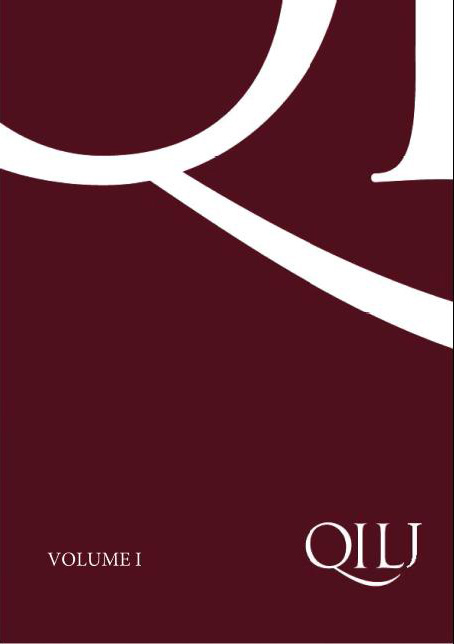
TABLE OF CONTENTS
Volume II – 2015
Scarica il QIL JOURNAL VOLUME II 2015.pdf
Part I. ZOOM OUT
The Question:
For all or for some? Functional immunity of State officials before the International Law Commission
Introduced by Beatrice Bonafé, Micaela Frulli and Paolo Palchetti
Riccardo PISILLO MAZZESCHI
The functional immunity of State officials from foreign jurisdiction: A critique of the traditional theories
Gionata P BUZZINI
The enduring validity of immunity ratione materiae: A reply to Professor Pisillo Mazzeschi
Philippa WEBB
Comment on ‘The Functional immunity of State officials from foreign jurisdiction: A critique of traditional theories’
Chimène I KEITNER
Functional immunity of State officials before the International Law Commission: The ‘who and the ‘what’
Natalino RONZITTI
The immunity of State organs – A reply to Pisillo Mazzeschi
Benedetto CONFORTI
A few remarks on the functional immunity of the organs of foreign States
Part II. ZOOM IN
The Question:
The inclusion of emissions from aviation in the EU ETS: Unilateralism vs multilateralism in international environmental governance Introduced by Elena Carpanelli, Annalisa Savaresi and Francesco Sindico
Kati KULOVESI
Unilateral extraterritorial action or ‘minilateralism’ within territorial jurisdiction? The EU Emissions Trading Scheme from aviation emissions and international law
Jacques HARTMANN
Unilateralism in international law: Implications of the inclusion of emissions from aviation in the EU ETS
IV TABLE OF CONTENTS
The Question:
Towards an Asylum Law of armed conflicts? The Diakité judgment of the Court of Justice of the European Union and its implications Introduced by Marco Pertile
Claudio MATERA
Another parochial decision? The Common European Asylum System at the crossroad between IHL and refugee law in Diakité
Alessandro BUFALINI
An autonomous notion of non-international armed conflict in EU Asylum law: Is there any role for International Humanitarian Law?
The Question:
The MONUSCO Intervention Brigade: A test-case for the application of International Humanitarian Law and International Criminal Law to a robust peace-keeping operation Introduced by Giulio Bartolini and Marco Pertile
Yutaka ARAI-TAKAHASHI
The Intervention Brigade within the MONUSCO. The legal challenges of applicability and application of IHL
Barbara SONCZYK
The protection of the Intervention Brigade under Article 8(2)(e)(iii) of the Rome Statute of the International Criminal Court
The Question:
The role of experts before the International Court of Justice: The Whaling in the Antarctic case
Introduced by Chiara Ragni
Makane Moïse MBENGUE
Between law and science: A commentary on the Whaling in the Antarctic case
Tullio SCOVAZZI
Between law and science: Some considerations inspired by the Whaling in the Antarctic case
Lucas Carlos LIMA
Weighting the evidential value of expert opinion: The Whaling Case
TABLE OF CONTENTS V
The Question:
On the relationship between IHL and IHRL ‘where it matters’ once more: Assessing the position of the European Court of Human Rights after Hassan and Jaloud Introduced by Marco Pertile and Chiara Vitucci
Ziv BOHRER
Human Rights vs Humanitarian Law or rights vs obligations: Reflections following the rulings in Hassan and Jaloud
Silvia BORELLI
Jaloud v Netherlands and Hassan v United Kingdom: Time for a principled approach in the application of th ECHR to military action abroad
The Question:
Does the ‘living instrument’ doctrine always lead to ‘evolutive interpretation’? Some remarks after Hassan v the United Kingdom Introduced by Francesca De Vittor and Cesare Pitea
Luigi CREMA
Subsequent practice in Hassan v United Kingdom: When things seem to go wrong in the life of a living instrument
Eirik BJORGE
What is living and what is dead in the European Convention on Human Rights? A comment on Hassan v United Kingdom
The Question:
Legal normativity through tacit agreements: Putting Peru v Chile into a broader perspective Introduced by Beatrice Bonafé and Paolo Palchetti
Jean d’ASPREMONT
The International Court of Justice and tacit conventionality
Giovanni DISTEFANO
L’accord tacite ou l’univers parallèle du droit des traités
The Question:
UN Immunity and the Haiti Cholera Case Introduced by Emanuele Cimiotta and Maria Irene Papa
Rosa FRIEDMANN and Nicolas LEMAY-HEBERT
Towards an alternative interpretation of UN immunity: A human rightsbased approach to the Haiti Cholera Case
Riccardo PAVONI
Choleric notes on the Haiti Cholera Case
VI TABLE OF CONTENTS
The Question:
What is the legal relationship between the International Criminal Court and non-state entities? Beyond the case of Palestine Introduced by Emanuele Cimiotta and Micaela Frulli
Harmen van der WILT The Rome Statute: Only States are invited to tune in
Nicola NAPOLETANO
Non-state entity’s ‘ability to lodge’ a declaration pursuant to Article 12(3) of the ICC Statute
The Question:
Sustainable investment in natural resources: How is international law doing? Introduced by Angelica Bonfanti
Francesca ROMANIN JACUR
Light and shadows in the relationship between international law and sustainable investments: The challenges of ‘natural resources grabbing’ and their effects on State sovereignty
Elizabeth BÜRGI BONANOMI
Sustainable investment in land in the Global South: What would it require from a coherence perspective? The Case of Sierra Leone
The Question:
Assessing the requirements for the indication of provisional measures by ITLOS: The order of 24 August 2015 in the Enrica Lexie case Introduced by Paolo Palchetti and Maurizio Arcari
Massimo LANDO
Establishing the existence of a ‘dispute’ under UNCLOS at the provisional measures stage: The Enrica Lexie case
Irini PAPANICOLOPULU
Considerations of humanity in the Enrica Lexie case
The Question:
Is the settlement of trade disputes under Regional Trade Agreements undermining the WTO dispute settlement mechanism and the integrity of the world trading system? Introduced by Angelica Bonfanti and Cesare Pitea
Gabrielle MARCEAU
The primacy of the WTO dispute settlement system
Luiz Eduardo SALLES
A deal is a deal: Party autonomy, the multiplication of PTAs, and WTO dispute settlement
